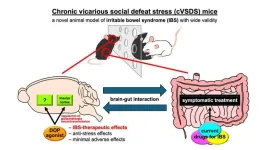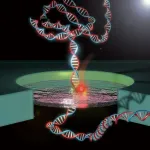(Press-News.org) New research estimates that globally, only 6.9 per cent of people with mental health or substance-use disorders receive effective treatment for their disorders.
Researchers from the University of British Columbia and Harvard Medical School analyzed survey data from nearly 57,000 participants in 21 countries collected over a 19-year period, to provide the clearest picture yet of where people discontinue their path to effective treatment for nine common anxiety, mood and substance-use disorders.
The biggest barrier to effective treatment is a person not recognizing that they need it, the study showed. However, even patients who contact the healthcare system often do not receive effective treatment.
“This survey data has allowed us to create the only effective treatment indicator that exists for mental health and substance use,” said lead author Dr. Daniel Vigo, associate professor at UBC's department of psychiatry and school of population and public health. “Policy decisions and allocative decisions for funding should be guided by data, and this hasn’t always been the case in the realm of mental health and substance use.”
The World Health Organization-World Mental Health Surveys Initiative collects data on the prevalence, severity and treatment of mental disorders worldwide. This study focused on survey participants who met criteria for a disorder under the Diagnostic and Statistical Manual of Mental Disorders-IV, a standardized classification system used by mental health professionals from 1994 to 2013.
The team, led by Dr. Vigo and Dr. Ronald Kessler of Harvard, was interested in how close participants got to receiving effective treatment that met evidence-based guidelines—and where they might have dropped off along the way.
They analyzed four key steps, and the percentage of people who proceeded from each step to the next:
Recognizes their need for treatment
Makes contact with the healthcare system about it
Receives a minimum level of adequate treatment
Receives effective treatment
They found:
Only 46.5 per cent of people who met the criteria for a disorder recognized their need for treatment.
Of those who did recognize their need, only 34.1 per cent turned to the medical system for help.
Most who sought help (82.9 percent) received a minimum level of adequate treatment.
About 47 per cent of people who received minimally adequate treatment ended up receiving effective treatment.
Attrition at various points along this pathway meant that only 6.9 per cent ended up receiving effective treatment.
“Understanding where the bottlenecks are for each of these disorders provides a unique and previously unavailable blueprint for decision makers to understand problems objectively and try to adjust the system,” said Dr. Vigo.
The study revealed a significant drop-off after patients contacted the healthcare system but before they received effective treatment. Since general practitioners and family doctors are typically their first point of contact with the system, it’s essential to make sure those doctors have appropriate training, said Dr. Vigo.
“Improving the ability of these general practitioners and family doctors to diagnose and treat the mild to moderate forms, and to know when to refer more severely affected folks to specialists, becomes the cornerstone of the system,” he said.
The research, published today in JAMA Psychiatry, provides decision makers with a base of evidence to guide policy and funding decisions in mental health and substance use. By highlighting gaps in service needs and outcomes for disorders ranging from bipolar disorders to addiction, it identifies where targeted investments could potentially yield the greatest impact. Armed with these insights, policymakers worldwide can prioritize interventions that result in improvements in care.
Interview languages: English, Spanish
END
Only seven out of 100 people worldwide receive effective treatment for their mental health or substance-use disorders
2025-02-05
ELSE PRESS RELEASES FROM THIS DATE:
Ancient engravings shed light on early human symbolic thought and complexity in the levantine middle palaeolithic
2025-02-05
New study demonstrates that certain incised stone artefacts from the Levantine Middle Palaeolithic, specifically from Manot, Qafzeh, and Quneitra caves, were deliberately engraved with geometric patterns, indicating advanced cognitive and symbolic behaviour among early humans. In contrast, artefacts from Amud Cave, with shallow and unpatterned incisions, are consistent with functional use. This research highlights the intentionality behind the engravings, providing key insights into the development of abstract thinking and the cultural complexity of Middle Palaeolithic societies.
Link ...
The sexes have different strengths for achieving their goals
2025-02-05
Many factors are needed to achieve our goals. Now researchers have looked at passion, drive and people’s ability to find flow.
“This is the first study to look at these factors together,"says Professor Hermundur Sigmundsson at the Norwegian University of Science and Technology (NTNU’s) Department of Psychology.
The researchers have found differences between the sexes. The results indicate that the sexes each have their own strengths when it comes to success.
Men are more passionate than women when it comes to achieving their goals. They also often have an easier time finding flow.
Women, ...
College commuters: Link between students’ mental health, vehicle crashes
2025-02-05
Young adults are a higher risk group for being in a crash while driving due likely to inexperience with driving, driving under the influence, and a greater propensity to take risks while driving. Although research has explored sociodemographic links of driver crashes based on age, sex and socioeconomic status, reports on the relationship between crashes and mental health are sparse.
A new Florida Atlantic University study fills a notable gap by exploring the correlation between commuter college students’ mental health status and being in a crash while driving. Commuter students, often lower-income, older, or balancing family responsibilities, face greater ...
Using sugars from peas speeds up sour beer brewing
2025-02-05
Sour beers have become a fixture on microbrewery menus and store shelves. They’re enjoyed for their tart, complex flavors, but some can require long and complicated brewing processes. Researchers reporting in ACS’ Journal of Agricultural and Food Chemistry brewed new sours in less time using a seemingly strange ingredient: field peas. The experimental beers had fruity — not “beany” — flavors and other attributes comparable to a commercial Belgian-style sour, but with shorter, simpler brewing steps.
“Sour beer is the beer enthusiast’s alternative to Champagne. By using sugars derived from peas that yeast ...
Stormwater pollution sucked up by specialized sponge
2025-02-05
Reusable sponge platform has successfully removed oil, phosphate and metal from contaminated water
New development allows capture of valuable minerals and reuse of the sponge
Water pollution concentrations move from 0.8 parts per million to undetectable levels
EVANSTON, Ill. --- As more waterways contend with algae blooms and pollution caused by minerals from agricultural runoff and industrial manufacturing processes, new methods to remove pollutants like phosphate, copper and zinc are emerging across fields.
While solutions exist, they tend to be costly ...
Value-added pancakes: WSU using science to improve nutrition of breakfast staple
2025-02-05
PULLMAN, Wash. — Typical breakfast pancakes are soft, fluffy and delicious but, sadly, not terribly healthy.
Food scientists at Washington State University are working to change that by boosting the popular morning favorite’s nutritional value while enhancing its taste and texture.
“Generally, pancakes are made with refined flours, contributing to empty calories,” said Girish Ganjyal, a professor and food processing specialist in WSU’s School of Food Science. “We wanted to see if it’s ...
Beyond the gut: A new frontier in IBS treatment by targeting the brain
2025-02-05
Irritable bowel syndrome (IBS) is a common digestive disorder that affects the intestine, causing symptoms such as abdominal pain, bloating, gas, and changes in bowel habits, including diarrhea, constipation, or both. Although this condition affects about a tenth of the global population, the underlying causes and mechanisms of IBS remain unclear. Consequently, treatments for IBS primarily focus on managing symptoms rather than addressing the root cause of the disorder.
At Tokyo University of Science ...
New spin on quantum liquids: Quasi-1D dynamics in molecular spin systems
2025-02-05
Quantum spin liquids (QSLs) are fascinating and mysterious states of matter that have intrigued scientists for decades. First proposed by Nobel laureate Philip Anderson in the 1970s, these materials break the conventional rules of magnetism by never settling into a stable magnetic state, even at temperatures close to absolute zero. Instead, the spins of the atoms within them remain constantly fluctuating and entangled, creating a kind of magnetic “liquid.” This unusual behavior is driven by a phenomenon called magnetic frustration, where competing forces prevent the system from reaching a single, ordered configuration. QSLs are notoriously ...
Spinal cord stimulation restores neural function, targets key feature of progressive neurodegenerative disease
2025-02-05
PITTSBURGH, Feb. 5, 2025 – A new drug-free, minimally invasive intervention targets the root cause of progressive loss of neural function in spinal muscle atrophy (SMA), an inherited neuromuscular disease. An intervention, which involves electrical stimulation of the sensory spinal nerves, can gradually reawaken functionally silent motor neurons in the spinal cord and improve leg muscle strength and walking in adults with SMA. The findings were reported by University of Pittsburgh School of Medicine researchers in Nature Medicine today.
Early results from a pilot clinical trial in three human volunteers with SMA show that one month of regular ...
Shut the nano gate! Electrical control of nanopore diameter
2025-02-05
Osaka, Japan—A gate that can be open or shut to allow or block the passing of species on one or both sides applies not only on the macroscale, for example a farm gate used to control stock movement, but also at the nanoscale, where a gate can control the translocation of single molecules.
A collaboration headed by researchers at Osaka University has developed a nanogate that can be open or shut by applying electricity. The nanogate shows various behaviors depending on the materials in the solutions on both sides of the gate and the applied voltage, making it attractive for different applications including sensing and controlled chemical reactions.
The ...







